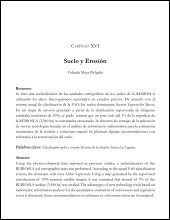| dc.creator | MAGDALENA LAGUNAS VAZQUES | |
| dc.creator | ADAN GERARDO SOSA Y SILVA | |
| dc.creator | LUIS FELIPE BELTRAN MORALES | |
| dc.creator | ALFREDO ORTEGA RUBIO | |
| dc.date | 2015 | |
| dc.identifier | http://cibnor.repositorioinstitucional.mx/jspui/handle/1001/1124 | |
| dc.identifier.uri | http://dspace.cibnor.mx:8080/handle/123456789/2091 | |
| dc.description | "The concept of gender is the central category of feminist theory. The notion of gender arises from the idea that the “feminine” and “masculine” are not natural or biological facts but cultural constructions. The gender perspective and its application as a new category of social analysis has its origins in the feminist movement, which conceptually fits in about 250 years of feminist theory and historical development. Importantly, gender framed both men and women, so the definition of femininity is in homology to that of masculinity, so that gender refers to those areas –both structural and ideological- involving relations between the sexes. Natural protected areas ( NPAs) around the world, mostly overlap, or are surrounded, by lands belonging to indigenous peoples, original communities and/or rural. In our country some studies shows that approximately 175 protected areas overlap with the territories of approximately 80 different cultures. The use and handling of natural resources that make rural populations are shaped by gender relations, as both women and men have different access and control over them. In our country, the status of women in rural areas is exponentially discriminatory because includes the poor, rural and indigenous, categories which render low literacy rates, higher reproductive rates, exhausting workdays, human rights abuses and, in greater proportion than anywhere else in the country, institutional and community indifference. Lack of fundamental rights. The gender perspective therefore allows building management processes and fair and equitable environmental management, and not to exclude women or men of the benefits that sustainable management of natural resources. The proposed methodology for use in gender studies in rural, surrounded by a protected area context, consider the use of multidisciplinary approach methodologies: qualitative and participatory (Participation Action Research PAR, Participatory Rural Appraisal). Using a multidisciplinary set of ethnosciences (ethnoecology, ethnobotanical and ethnobiology) as primary tools in qualitative research activities..." | |
| dc.description | "El concepto de género es la categoría central de la teoría feminista. La noción de género surge a partir de la idea de que lo «femenino» y lo «masculino» no son hechos naturales o biológicos (instintivos), sino construcciones culturales, aprendidas. La perspectiva de género y su aplicación como una nueva categoría de análisis social tiene sus orígenes en el movimiento feminista, que conceptualmente se enmarca en aproximadamente 250 años de desarrollo teórico e histórico feminista. Es importante señalar que el género enmarca tanto a hombres como a mujeres, que la definición de feminidad se hace en homología con la de masculinidad, por lo que género se refiere a aquellas áreas –tanto estructurales como ideológicas– que comprenden relaciones entre los sexos. Las áreas naturales protegidas (ANPs) en el mundo, en su mayoría se traslapan o se encuentran rodeadas de territorios pertenecientes a pueblos indígenas, comunidades originales y/o rurales. En nuestro país algunos estudios establecen que 175 áreas naturales protegidas se traslapan con los territorios de 80 diferentes culturas. El uso y manejo que hacen de los recursos naturales las poblaciones rurales están conformados por las relaciones de género, ya que tanto las mujeres, como los hombres, tienen acceso y control diferente –y en algunos casos– desiguales sobre los mismos. En nuestro país, la condición de las mujeres en las zonas rurales es exponencialmente discriminatoria, asignándoles categorías tales como pobres, rurales e indígenas, lo que inminentemente se acompaña de altos índices de analfabetismo, altas tasas reproductivas, jornadas laborales extenuantes, abusos a sus derechos humanos indiscriminadamente y en mayor proporción que en ningún otro lugar en el país, indiferencia institucional y comunitaria, carecen de derechos fundamentales. La perspectiva de género, por tanto, permite construir procesos de gestión y manejo ambiental equitativos y justos. La presente propuesta metodológica para emplearse en los estudios de género en un contexto rural, inmerso en un área natural protegida, considera el uso de metodologías multidisciplinarias con enfoque: cualitativo y participativas (Investigación Acción Participación IAP, Evaluación Rural Participativa). Uso de un conjunto multidisciplinar de herramientas (etnoecología, etnobotánicas y etnobiología), como principales actividades de investigación cualitativa..." | |
| dc.format | application/pdf | |
| dc.language | spa | |
| dc.publisher | CENTRO DE INVESTIGACIONES BIOLÓGICAS DEL NOROESTE, S. C. | |
| dc.publisher | UNIVERSIDAD AUTÓNOMA DE YUCATÁN, MÉRIDA | |
| dc.publisher | UNIVERSIDAD MICHOACANA DE SAN NICOLÁS DE HIDALGO, MORELIA | |
| dc.relation | info:eu-repo/semantics/reference/ISBN/ISBN: 978-607-424-558-5 | |
| dc.relation | citation:Lagunas-Vázques, M., A. Gerardo Sosa y Silva, L. F. Beltrán-Morales y A. Ortega-Rubio. 2015. La perspectiva de género en los estudios sociales en las ANPs de nuestro país: una propuesta conceptual y metodológica. En: Ortega–Rubio, A., M. J. Pinkus-Rendón e I. C. Espitia-Moreno (Editores). Las Áreas Naturales Protegidas y la Investigación Científica en México. (pp. 211-248). Centro de Investigaciones Biológicas del Noroeste S. C., La Paz B. C. S., Universidad Autónoma de Yucatán, Mérida, Yucatán y Universidad Michoacana de San Nicolás de Hidalgo, Morelia, Michoacán, México. 572 pp. | |
| dc.rights | info:eu-repo/semantics/openAccess | |
| dc.rights | http://creativecommons.org/licenses/by-nc-nd/4.0 | |
| dc.source | LAS ÁREAS NATURALES PROTEGIDAS Y LA INVESTIGACIÓN CIENTÍFICA EN MÉXICO | |
| dc.subject | info:eu-repo/classification/AUTOR/metodología perspectiva género ANPs, propuesta conceptual | |
| dc.subject | info:eu-repo/classification/AUTOR/gender- perspective methodology NPAs , conceptual proposal | |
| dc.subject | info:eu-repo/classification/cti/5 | |
| dc.subject | info:eu-repo/classification/cti/63 | |
| dc.subject | info:eu-repo/classification/cti/6301 | |
| dc.subject | info:eu-repo/classification/cti/630101 | |
| dc.subject | info:eu-repo/classification/cti/630101 | |
| dc.title | La Perspectiva de Género en los Estudios Sociales en las ANPs de Nuestro País: una Propuesta Conceptual y Metodológica | |
| dc.type | info:eu-repo/semantics/bookPart | |
| dc.type | info:eu-repo/semantics/publishedVersion | |

